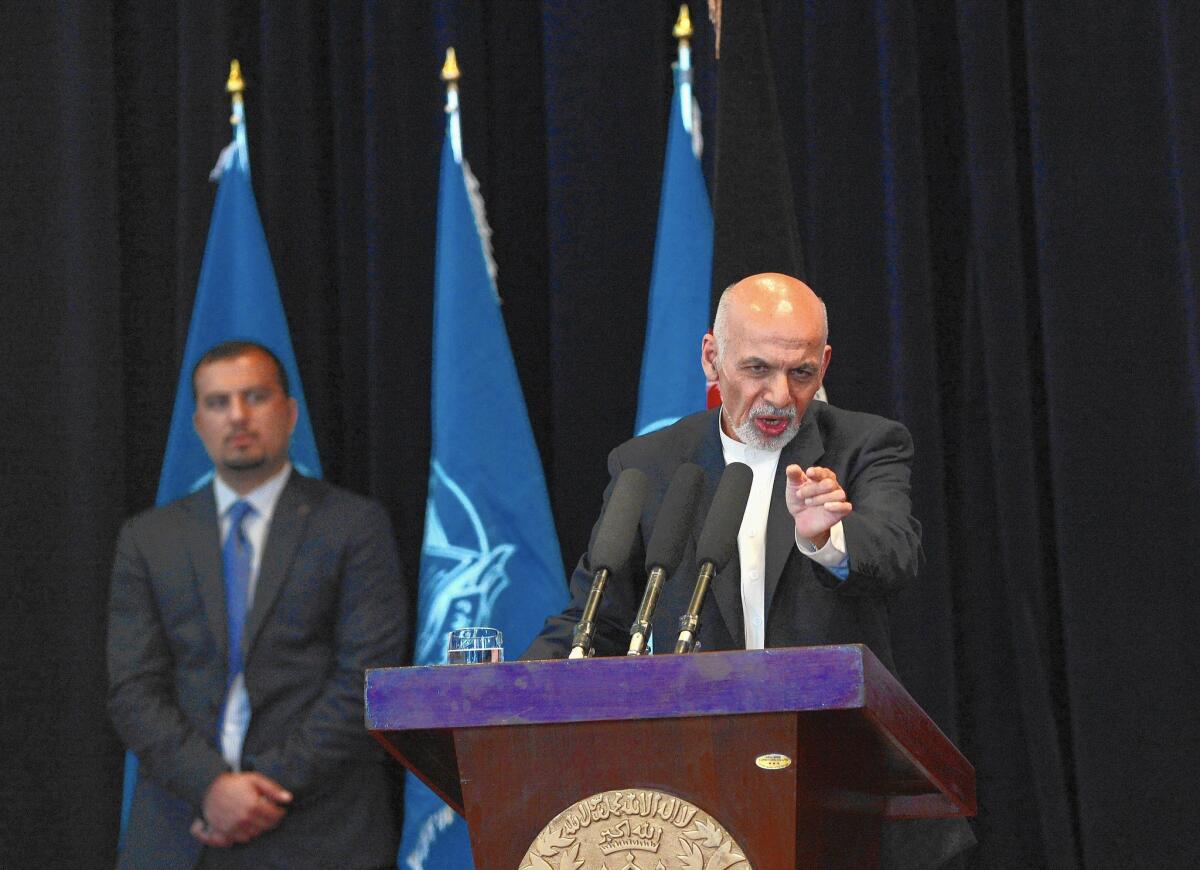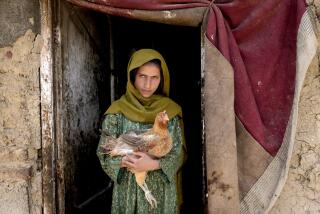Afghanistan’s new president faces a campaign-scarred economy

As a former World Bank official, Afghanistan’s new president has helped develop economic programs for Russia, India and China. But it is in his homeland that Ashraf Ghani Ahmadzai faces the greatest fiscal challenge of his career.
As coalition troops depart and with future foreign aid levels uncertain, Afghanistan is racked by an estimated 35% unemployment rate and a notable dip in small-business activity since the spring. Ghani, a former Afghan finance minister, acknowledges that the road forward will be difficult.
“We are no longer in a light recession; it’s either a very deep, biting recession or the beginning of a depression,” he told reporters recently.
In 2012 alone, Afghanistan received $6.7 billion in foreign assistance. But today Ghani must keep a realistic outlook, recognizing that 13 years of corruption allegations do not instill confidence in world capitals weary of their already lengthy involvement in the country.
“2015 is not 2009,” Ghani said. “Tens of billions of dollars of assistance and hundreds of thousands of international soldiers are not going to show up.... International assistance requires accountability.”
Washington says it remains committed to “seeing Afghanistan succeed” but plans to take a cautious economic approach.
James B. Cunningham, the U.S. ambassador, said at a recent news briefing that the chances of any “new money” being filtered into the country were low.
For the 32 million Afghans now led by Ghani, the presidential campaign marked a long period of uncertainty that many worry could be a precursor to even more difficult times ahead.
Ghani has said that during the 10-month campaign Afghanistan lost an estimated $5 billion to $6 billion in economic activity because of investor and consumer unease.
In Kabul, the capital, building painter Toryalai has begun working instead as a taxi driver to make ends meet. The 27-year-old, who, like many Afghans, goes by one name, said the economic burdens of being newly engaged and not having enough work have led him to think about suicide.
“It’s become too much. Months have passed and there are still no work prospects,” he said. “I seriously considered killing myself, but I had to remind myself everything passes, that if the government won’t take care of you, God will.”
Even though Toryalai knew he wasn’t alone, with a major religious holiday just over the horizon, the pressure felt especially heavy.
The weight of upholding holiday customs — buying new clothes, providing candy and other sweets to dozens of visitors and slaughtering an animal as an offering to God — was compounded by his obligations to his fiancee’s family.
“I still don’t know how I’m going to be able to buy them gifts,” he said.
For business owners, the uncertainty surrounding the nation’s first democratic, peaceful transition of power left them in limbo, as investors stayed on the sidelines and consumers held off on purchases. (Lengthy negotiations after a controversial runoff election finally led Ghani and his rival, Abdullah Abdullah, to sign an agreement that averted potentially cataclysmic upheaval.)
As recently as last year, Saeed Mohammad, 40, made a comfortable living selling mattresses at a roundabout behind Kabul’s Eidgah Mosque. Since January, he said, he’s been lucky to sell two $15 mattresses a day.
“Everyone kept talking about 2014 this, 2014 that, and we focused all of our attention on that, but we were too busy with 2014 to realize that it has been this election that’s ruined us,” Mohammad said.
For those who deal in seasonal goods, things have been even more bleak.
Abdul Ghafor, 36, who owns a small store in a Kabul electronics market, said he would be heading into the winter with a glut of fans.
“I used to sell 5,000 or 6,000 fans a season; this year I’ve sold maybe 2,000,” he said. The surplus stock, which Ghafor cannot return to China and Pakistan, will take up space he could have used to display winter-appropriate goods.
Mohammad Ibrahim, 28, a cookware salesman in Mandawi, Kabul’s largest outdoor market, said he went from a triple-digit profit last year to selling “everything at a loss” in 2014.
The dismal economic activity is reflected in major indicators as well. The World Bank has projected growth of just 1.5% for Afghanistan this year.
Still, Ibrahim said that being able to sell his wares at a public market without fear of rocket fire from civil warfare or of drawing the ire of the Taliban’s religious police is a vast improvement.
“Even with all the setbacks, we should be happy with what we have now,” he said. “Now we know who will lead us.”
Such sentiments may go a long way toward the success or failure of the Ghani-led unity government.
In an effort to track the new president’s progress on his campaign pledges, Impassion Afghanistan, the nation’s first digital media agency, has launched a project called SadRoz (“100 Days”), which will look at 23 economic promises made by Ghani.
Ahmad Shuja, the agency’s co-founder, said the promises include such things as promoting cotton cultivation in the southern province of Helmand and preventing capital flight.
In his first week in office, Ghani set out to reclaim more than $900 million looted by executives and other insiders from Kabul Bank, the nation’s largest private savings and loan, which required a government bailout that almost destroyed the banking sector.
Ghani’s move, said Najeeb Azizi, a professor of economics at Kabul University, was proof to Afghans that he “wants to gain the trust of the people and make a concerted effort to fight corruption.”
However, on the day the bank case was reopened, a move more likely to erode public trust also was made: Ghani appointed former Finance Minister Omar Zakhilwal as his finance advisor. Zakhilwal, who has been accused of corruption, is viewed with unease by many Afghans.
“President Ahmadzai started well. However, tackling corruption must start within. You can’t appoint thieves as advisors!” one tweet said in reference to Zakhilwal.
Yet even if Afghanistan’s days of foreign investment are over, Azizi said, Ghani can use previously received funds to counteract the economic slowdown.
“In the past, the international community, untrusting of Afghan institutions, did not go through Afghan institutions — the Central Bank and treasury — to distribute its aid, but now Ghani must persuade them to work with Afghan institutions when budgeting those funds,” he said.
If done effectively, that could not only reinstate trust in the Kabul government among the international community, but also help spend the funds in a way that is “more of a priority to the Afghan government than the international community.”
Latifi is a special correspondent.
More to Read
Start your day right
Sign up for Essential California for news, features and recommendations from the L.A. Times and beyond in your inbox six days a week.
You may occasionally receive promotional content from the Los Angeles Times.






